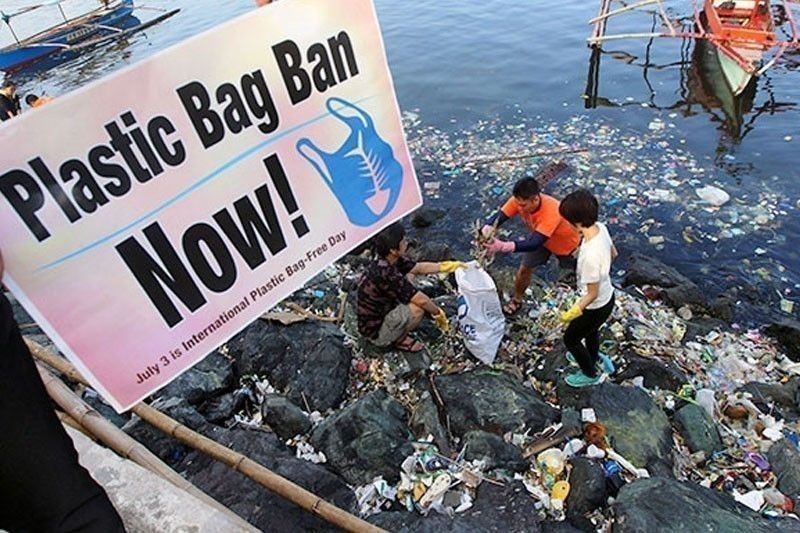Commentary: A broad-based approach to solid waste management

The market for environmentally conscious products – sustainable alternatives – is unmistakably growing. From tumblers, metal and glass straws, reusable cotton pads, shampoo bars to bamboo toothbrushes, people are becoming more conscious of the products they purchase and consume, cutting back on single-use plastic, and lessening their environmental impact.
In light of the plastic pollution crisis in Manila Bay alone, we need all the help we can get. Cleanup operations by the Metropolitan Manila Development Authority reportedly yielded 3,810 tons of garbage, water hyacinth, and silt from the bay’s coastline and drainage system as of last month. In other reports, collected waste reached 27,000 tons of garbage.
This is decades old of accumulated waste due to incessant and irresponsible disposal of garbage onto the bay, lack of waste infrastructure, and inexistent regulatory monitoring for both households and industries.
The good thing is the ongoing rehabilitation and resettlement program of the Department of Environment and Natural Resources is steadily gaining ground.
In coordination with other government agencies, weekly coastal cleanups, ensuring compliance with sewage treatment facilities by different establishments, and monitoring fecal coliform levels are continuously being undertaken.
DENR already issued notices of violations to non-compliant commercial establishments in the area. The program also received P2 billion in augmentation fund to ensure continuity in its operations and to meet its targets.
Businesses by themselves embraced the value of sustainability by exploring greener alternatives in packaging and introducing eco-friendly products.
Private enterprises have an important role especially in compliance with environmental regulations. They can introduce as well as strengthen paradigm shifts to address plastic pollution – a circular economy of waste, so to speak.
A crucial segment of a circular economy is the recycling industry and translates to the volume of plastic waste collected in our waterways.
While current waste management infrastructure and systems have failed to keep up to what could have been an avoidable problem, this does illustrate a golden opportunity in plastic recycling. Not to mention, the number of recyclable plastic waste pales in comparison to the amount of plastic waste leaked to the ocean and those that are uncollected.
Recycling is a necessary measure as well as a logical market response to manage plastic waste pollution. While we do already have an existing recycling industry in the country, it needs to be seriously upscaled.
Recycling facilities in the country only process a sparse volume of waste compared to what is generated on a national level. It does not even reconcile with the volume of plastic waste in the ocean from the Manila Bay clean up alone.
Coca-Cola Philippines Inc. is one of many global businesses that aim to bridge that gap through its state-of-the-art recycling and reprocessing facility, the first in Southeast Asia.
To initiate this, in line with its World Without Waste vision initiative, a sustainability model was developed that can be adapted and replicated with other local government units.
Coca-Cola Philippines Inc. recently entered into a public-private partnership with the City of Manila to allocate Recycled PET benches, collection bins, and provide capability training for the Manila Bay cleanup.
In fact, it recently launched the country’s first-ever food-grade PET bottle made of 100% recycled material – The Viva! Eco-bottle. It also entered into a similar partnership in Davao by working with its communities and LGUs.
Collected PET are diverted to the recycling system and transformed into high-value products such as chairs and benches.
The model is a source of green jobs and livelihood opportunities, an advantage for the Philippine economy, and a solution for environmental and technological advancement.
The recycling industry then emphasizes the need and opportunity to close the loop in our Solid Waste Management system and in our collection efforts to augment the supply of plastic recyclables.
However, it is about creating a seamless and integrated industry which is at the forefront of what businesses like Coca-Cola aims to exemplify.
In Stratbase ADR institute’s recent publication, “Revitalizing the Philippine Recycling Industry A Viable Strategy for Solid Waste Management,” it was recommended that we need a broad-based approach that will streamline essential strategies, and encourage the participation of all stakeholders – households, establishments, waste-pickers, small-scale recycling centers, private partners, LGUs, and national agencies.
If done effectively, this can be scaled to higher levels of Solid Waste Management (SWM) efforts such as waste reduction, and ultimately reduce landfill dependence.
Policy instruments applied by other countries such as plastic bans are unsuccessful in reducing plastic waste. Unless there are technological, social, and waste management system responses, such initiatives will not work.
According to a report by the United Nations, 127 countries have or are working toward regulations on banning plastic. While the goal is to shift the production of these disposable products to use more sustainable materials, the effectiveness of these regulations is uncertain without available innovative and environmentally sound alternatives and a strong SWM system.
This also has to be developed in parallel with putting in place policies, systems and mechanisms to establish seamless coordination of households, private entities, and LGUs for collection and recovery.
An efficient recycling industry, well-integrated within a circular economy, upscales the economic value of waste down to the communities. It reinforces and incentivizes environmental awareness and discipline in segregation and recycling which is hardly controlled even at the household level.
However, an effective recycling industry, especially large-scale recycling facilities, can also help enable and support projects like the Manila Bay cleanup. Not only will their green packaging technology, manufacturing expertise, and financial and human capital BE valuable for innovation and reach and scale.
And if coordinated well, this should be able to complement rationalized plans and policies from government and responsible consumer behavior that will create wide-reaching sustainable development impacts.
Vanessa Pepino is a non-resident fellow of think tank Stratbase ADR Institute, a partner of Philstar.com.
- Latest
























